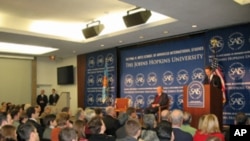"The economic relationship between the United States and China provides tremendous benefits to both our nations. Even though we compete in many areas, our economic strengths are largely complementary," said U.S. Secretary of the Treasury Timothy Geithner on January 11th, in a speech at Johns Hopkins University.
This is "a time of important transition for the world economy, the Chinese economy, and the U.S. economy," said Secretary Geithner.
Due to its size relative to the global economy, "China faces a very complicated set of challenges as it transitions toward a more open, market oriented economy. It is very much in our interest that the Chinese manage these challenges successfully," he said.
China’s economic growth was made possible by numerous reforms, a growing labor force, and a rapid shift from farms to factories.
But it was also facilitated by the access China enjoyed to the foreign markets, the investments, and the technology of the U.S. and other major economies, said Secretary Geithner.
Clearly, China needs the United States, but the United States also benefits from our rapidly expanding economic relationship with China. And if this relationship is to grow, and to benefit both countries, and indeed the global economy, both the U.S. and China must make some adjustments.
First, China must expand opportunities for U.S. companies to export and sell to the Chinese market. China must level the playing field by removing subsidies, trade barriers and laws that discriminate against foreign companies. It must stop looking outside its borders for economic growth and begin to target production toward Chinese consumers. It must strengthen its currency with respect to the global market. And it must address the wide-spread practice of intellectual theft.
In turn the U.S. will make progress on China’s objectives, such as greater access to U.S. high technology products, increased investment opportunities in the United States, and terms of access similar to those the U.S. affords market economies.
"The U.S. and China have a great deal invested in each other’s success," said Secretary Geithner. "If we preserve and build on [our] strengths, and if China successfully continues on its path to a more open, market economy, then both our countries and the world economy will be in a much stronger position."
U.S. - Chinese Economic Relationship

"The economic relationship between the United States and China provides tremendous benefits to both our nations."



